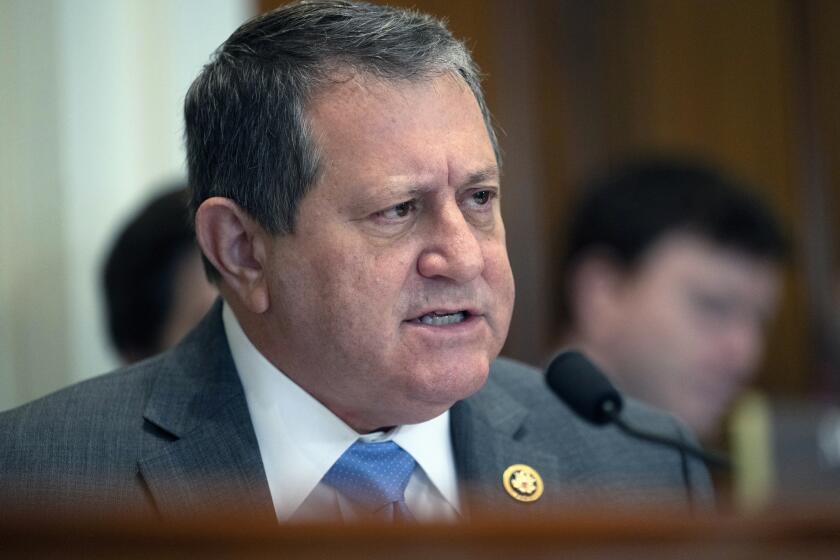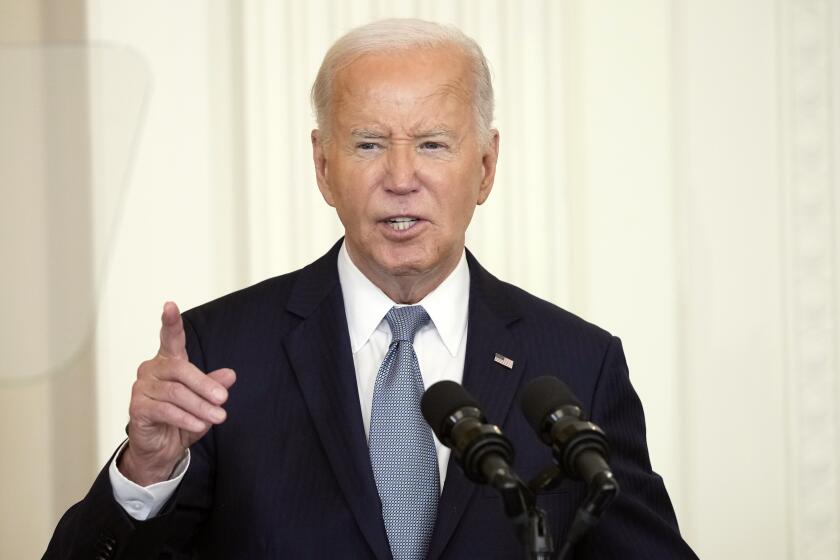Confusion Is the Watchword as Mexico Tinkers With Time
Residents of the Mexican capital these days could be forgiven for humming the refrain from the old Chicago song: “Does anybody really know what time it is?”
Their leftist mayor, Andres Manuel Lopez Obrador, has decreed that the Federal District will not adopt daylight saving time when nearly all the rest of Mexico moves the clocks forward on the first Sunday in May.
He was responding this week to an unorthodox telephone referendum in the city over the weekend in which callers voted by a 3-to-1 ratio against darker mornings. Lopez Obrador’s critics scoffed that the telephonic turnout involved only about 5% of the registered voters in this city.
If Mexico City holds the clock back, chronometric chaos could reign.
The Federal District--similar to the District of Columbia--is home to just under half the 18.5 million people in the Valley of Mexico; the rest live in the state of Mexico, which will switch to daylight saving time. It would be as if residents of Virginia and Maryland had to change their watches every time they entered Washington.
And it may be far worse. The office of President Vicente Fox has responded that the many federal offices, hospitals and banks in the capital will indeed go on summer time, whatever Lopez Obrador decrees. The capital’s airport, on federal territory, would thus also stay with the nation, raising prospects of plenty of missed flights.
And four--out of 16--district leaders in Mexico City from Fox’s center-right National Action Party said they will ignore the mayor’s edict and go on daylight time. So there could even be different time zones within the city itself.
In an interview with the left-wing daily La Jornada published this week, Lopez Obrador defended his stance, calling daylight saving time “a commitment made by the technocracy to international financial groups. The stock exchange cannot be more important than the lives of the citizens. . . . They cannot, from abroad, impose on us what time we must wake up, what time we must go to work, what time we must go to sleep.”
Behind the dispute lies a head-on political clash between Lopez Obrador, who many believe aspires to lead Mexico’s left into the next presidential election in 2006, and Fox, who soundly trounced Lopez Obrador’s predecessor, Cuauhtemoc Cardenas, in the presidential election last July.
Lopez Obrador won the mayoralty promising to consult the people directly on key issues. His campaign exploited the daylight saving time issue in class terms, noting that the poor are the ones who have to get up in the dark to get to work and whose children have to walk to school before sunrise. He vowed to hold a referendum to gauge people’s views before deciding.
A talk-show comedian, Andres Bustamante, mused: If Lopez Obrador gives the city keys to Zapatista rebel leader Subcommander Marcos during his visit this month, will the mayor then hold a referendum on whether to change the locks?
But the mayor himself used an old joke to underscore what he sees as a challenge to Mexico’s old-style rule, which he insists is intact despite Fox’s election. The days are past, Lopez Obrador said, when the president asked his aides the time and was told, “Whatever time you’d like it to be, sir.”
In fact, Fox did decree last month that daylight saving time would be shortened from seven months to five months, beginning the first Sunday in May. That puts Mexico at odds with the United States and other nations that institute daylight time on the first Sunday in April.
To complicate matters even more, border states, including Baja California, Chihuahua and Nuevo Leon, will go on daylight time on the first Sunday of April, to keep in sync with the United States. And Sonora, like Arizona, will not adopt summer time at all. These states won federal permission to depart from Fox’s five-month DST.
What’s more, Education Secretary Reyes Tamez said Wednesday that all schools in Mexico City will operate by daylight time, which would undercut one of the mayor’s goals. Mexican schools fall under federal rules.
Lopez Obrador said Fox had acted without constitutional authority in imposing summer hours, arguing that such decisions are a congressional responsibility. He has said he will file a Supreme Court challenge to Fox’s ruling, so the dispute could end up having significant political repercussions.
The presidency responded that the constitution doesn’t assign the states any authority over daylight saving time, which leaves it within presidential authority--as former Mayor Cardenas himself acknowledged in 1999 when he backed away from a confrontation over the issue.
Presidential spokeswoman Martha Sahagun said the referendum outcome in Mexico City was predictable, saying, “If the question had been whether people like to pay taxes, the natural answer would also be no.”
She added, however, that a presidential opinion poll had found that 59% of respondents said they thought the government was right to apply daylight saving time, given the benefits.
In light of those pluses, the government has struggled to explain clearly why Fox reduced daylight time by two months. Sahagun said the president wanted “to address in some way the petitions of the citizens.”
Sahagun did address the most common complaint--that people don’t adjust well to the time change. She cited research saying the body adjusts to a one-hour time change in no more than 72 hours.
And she said the benefits of daylight saving time are clear: In the last three years, she said, the country has saved the equivalent of 150 million 60-watt lightbulbs turned on for an hour a day for the entire year. She noted that 75 countries use daylight saving time and that Mexico, which introduced DST in 1996, needs to stay aligned with its major trading partners.
That argument plays into the hands of those who see daylight time as a conspiracy of foreign capitalists trying to force Mexico to comply with Wall Street trading hours and bully it into saving power--so it can hand it over to California and other power-starved U.S. states.
Carlos Marin, a columnist in the daily Milenio, wrote that the dispute “descends into the arena of the absurd. One merely has to imagine what it will be like to cross one of the hundreds of streets that pass through different districts of the capital and find oneself with one hour more, or less, to eat, work, go to a movie or die.”
More to Read
Start your day right
Sign up for Essential California for news, features and recommendations from the L.A. Times and beyond in your inbox six days a week.
You may occasionally receive promotional content from the Los Angeles Times.






